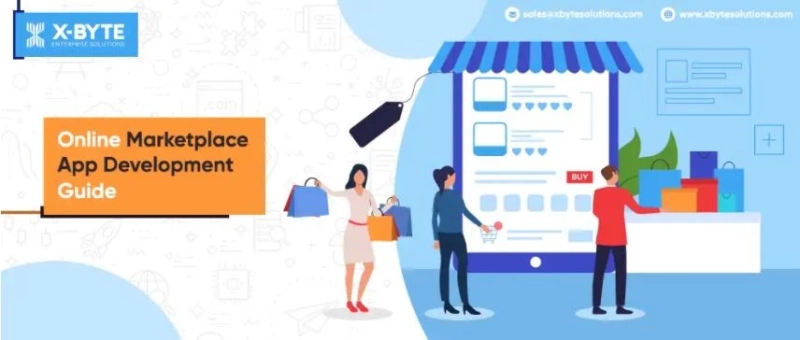Marketplaces are no longer synonymous with the crowded avenues on weekend mornings. People don’t flock to a commonplace anymore. Nor do they wait in line to purchase their preferred products and services on deals. With online marketplace app development everyday is either a sale or a festive occasion with people buying things they needed, didn’t need, felt impulsive to buy and more. From hand picking farm-fresh vegetables and groceries to manually trying out apparel and clothing accessories, we have come to getting them delivered at doorsteps and trying them on virtually through AR and VR technologies. Online marketplaces are the current rage and their prominence has increased further after the onset of the global pandemic. While every other industry either shut down or struggled to cope up with its operations and crumbling economic conditions, the only industry that not just survived but soared during the pandemic was eCommerce and its allied segments like marketplaces, on-demand business services and more. People preferred to stay away from any and all forms of human contact and decided to shop online. Even the boomer generation that was staunchly against online shopping and other forms of non-conventional mediums got a taste of marketplaces and their convenience. This pushed several businesses out there to bring in digital transformation into their operations and prefer marketplace app development to attract new customers from beyond their geographical locations. So, if you’re someone who is eyeing marketplace mobile app development for your venture, this exclusive guide is just for you. We break down all essential details you need to know about marketplace development including what it is, its advantages, setting up an online marketplace and more.
Let’s get started. Visualize a commercial complex in your neighborhood that has multiple shops across diverse genres, products and services. When you visit these complexes, you are free to go to any shop and purchase your preferred products. The same applies to malls and shopping avenues as well. Now, imagine the same mall on the internet. What you will see is a marketplace - an online platform that offers products, brands and services for you to choose from. There are shops from different vendors and brands and you have amazing options to choose from. Furthermore, these brands are also competing with their deals and discounts to get you to purchase from their shops. This is exactly what a marketplace is all about. To access these marketplaces, you either use a website or an app. The latter is gaining more popularity these days.
Before we further understand marketplace development, let’s look at some key statistics to get to know the market conditions better. eCommerce sales topped over $4tn in the year 2020. Amazon’s profits grew by around 80% in the same time. Over 3.4bn people across the world purchase products and services from the eCommerce sector. eBay has over 1bn active listings on its platform. On an average day, over 2 billion transactions happen on eBay. Before you venture into marketplace development, you should understand that there are different types of marketplaces. From the outlook, they all look the same but when you dig deeper, you realize the subtle differences they showcase. Let’s look at what the types of marketplaces are. B2C stands for Business To Clients and these are marketplaces setup by marketplayers to cater to the needs of consumers. For instance, consider Amazon, Walmart, TaskRabbit (service) and more. Marketplace development strategies for the B2C domain are unique. Abbreviated as Business To Businesses, these cater to other businesses. These could be wholesale units that supply to local vendors, who ultimately sell to consumers. They could also be industrial units that distribute products and goods to multiple vendors across the globe. B2B marketplace development requires a niche approach and a different type of marketing and targeting technique. Alibaba B2B is the best example for this sector.Key Statistics
Types Of MarketplacesB2C
B2B
Peer To Peer is the full form of P2P and the aim of this marketplace is to connect sellers with buyers. While it does sound similar to B2C, the major difference here is that sellers and buyers are both individuals. For instance, if an individual from Colorado decides to sell their Lego collection, an interested buyer would contact them through the P2P platform from California and place an order. Packaging, shipping and fulfillment are all done by individuals in this segment. eBay is the most ideal example of P2P marketplaces. While online stores and marketplaces are both concepts of the eCommerce spectrum, one has a significant edge over the other. At this point, pay attention to the term ‘edge’ here because both are unique, beneficial and super-convenient at the same time. However, online marketplaces have an edge over their online store counterparts that will prove to be profitable for those who prefer online marketplace app development. To help you get a clear idea of what this edge is about, here’s a quick tabular comparison.P2P
Your Guide To Marketplace App Development Marketplace app development isn’t simple. Right from ideation and designing an effective platform to ensuring orders are fulfilled on time, all modules, processes and systems should fall in place and work in tandem with each other. For those of you who are just starting out, these quick tips on marketplace app development and marketplace website development will help you get an idea of the complete picture.
Decide On Your Market Segment
One of the first steps in marketplace development is to decide on your market segment. Like we saw, there are three types of marketplaces - B2B, B2C and P2P. Based on your domain expertise, interests, experiences and team available, you should decide the segment you are about to venture into.
This will help you decide the type of website or app you will eventually build, the networking you should do, the associated marketing and promotional strategies, business models and more.
| Read Original Blog Here : https://www.xbytesolutions.com/blog/online-marketplace-app-development


